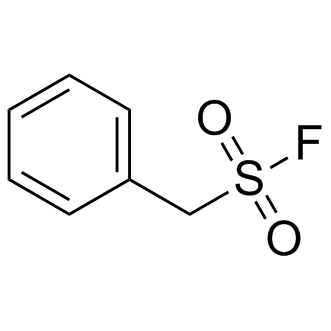All AbMole products are for research use only, cannot be used for human consumption.

PMSF (Phenylmethyl sulfonyl fluoride) is an irreversible serine/cysteine protease inhibitor. PMSF rapidly inactivates purified chymotrypsin from human pancreas, although human trypsin is less susceptible to inhibition by PMSF. C14-labeled PMSF penetrates human red cells rapidly and inhibits acetylcholinesterase in situ. PMSF is known as phospholipase C inhibitor and also as acetylcholine esterase inhibitor. PMSF inhibits arachidonic acid release during first 4 minutes of ischemia. PMSF inhibits acetylcholine esterase activity in the early stage of complete cerebral ischemia, and induces an inhibition of increase of extracellular glutamate level. PMSF inhibits the addition of ethanolamine phosphate to glycosylphosphatidylinositol (GPI) intermediates in Trypanosoma brucei. PMSF also inhibits the acylation of the inositol residue of GPI intermediates in bloodstream form T. brucei. PMSF is capable of altering the actions of anandamide in vitro by blocking its metabolism. Administration of PMSF in vivo produces cannabinoid effects by altering endogenous levels of anandamide and potentiates the effects of exogenously administered anandamide. Administration of PMSF can induce both promotion and protection in organophosphorus ester-induced delayed neuropathy (OPIDN) in hens. Pretreatment with PMSF results in a leftward shift of the anandamide dose effect curves for antinociception and hypothermia in male mice. Acetylcholinesterase (AChE), a serine hydrolase, is potentially susceptible to inactivation by PMSF. Pretreatment with PMSF protects against the degradation of neurofilaments in tri-ortho-cresyl phosphate (TOCP) induced delayed neuropathy in hens. PMSF treatment enhances the behavioral effects of endogenous and exogenous cannabinoid agonists in mice or rats.

J Adv Res. 2025 Apr 08.
Teleost GSDMEc regulates GSDMEa-mediated pyroptosis
PMSF purchased from AbMole

Food Bioscience. 2025 Apr 28.
High-fat diet-induced obesity accelerates the progression of food allergy through synergistic effect of gut microbiota and lipid metabolism
PMSF purchased from AbMole

Curr Issues Mol Biol. 2024 Dec 09.
SIRT1 Activation Suppresses Corneal Endothelial–Mesenchymal Transition via the TGF-β/Smad2/3 Pathway
PMSF purchased from AbMole

EMBO Rep. 2023 Mar 28;e55903.
PcEiger links the Imd/Relish pathway to ROS production in the intestine of the red swamp crayfish
PMSF purchased from AbMole

Clin Epigenetics. 2023 Jul 5;15(1):109.
FTO-dependent m6A regulates muscle fiber remodeling in an NFATC1-YTHDF2 dependent manner
PMSF purchased from AbMole

Cell Death Differ. 2022 Jul;29(7):1395-1408.
SARS-CoV-2 membrane protein causes the mitochondrial apoptosis and pulmonary edema via targeting BOK
PMSF purchased from AbMole

Front Pharmacol. 2022 Jul 18;13:943111.
(±)-5-bromo-2-(5-fluoro-1-hydroxyamyl) Benzoate Protects Against Oxidative Stress Injury in PC12 Cells Exposed to H 2 O 2 Through Activation of Nrf2 Pathway
PMSF purchased from AbMole

J Cell Mol Med. 2022 Jul;26(14):4048-4060.
BRAF V600E protect from cell death via inhibition of the mitochondrial permeability transition in papillary and anaplastic thyroid cancers
PMSF purchased from AbMole

J Nanobiotechnology. 2021 Nov 25;19(1):391.
Nanovesicles derived from bispecific CAR-T cells targeting the spike protein of SARS-CoV-2 for treating COVID-19
PMSF purchased from AbMole

Cells. 2021 Feb 18;10(2):430.
Knockdown of AKT3 Activates HER2 and DDR Kinases in Bone-Seeking Breast Cancer Cells, Promotes Metastasis In Vivo and Attenuates the TGFβ/CTGF Axis
PMSF purchased from AbMole

Int J Mol Med. 2021 May;47(5):70.
circNRIP1 facilitates keloid progression via FXR1‑mediated upregulation of miR‑503‑3p and miR‑503‑5p
PMSF purchased from AbMole

Lipids Health Dis. 2021 Apr 26;20(1):40.
Elucidation of SIRT-1/PGC-1α-associated mitochondrial dysfunction and autophagy in nonalcoholic fatty liver disease
PMSF purchased from AbMole

Arch Virol. 2021 Aug;166(8):2173-2185.
Interplay of the ubiquitin proteasome system and the innate immune response is essential for the replication of infectious bronchitis virus
PMSF purchased from AbMole

Mol Cell. 2020 Nov 19;80(4):607-620.e12.
Paradoxical Mitophagy Regulation by PINK1 and TUFm
PMSF purchased from AbMole

Mar Drυgs. 2020 Oct 28;18(11):538.
Immunostimulatory Effects of Polysaccharides from Spirulina platensis In Vivo and Vitro and Their Activation Mechanism on RAW246.7 Macrophages
PMSF purchased from AbMole

Drug Chem Toxicol. 2016 Oct;39(4):392-9.
Effects of 2,4-dichlorophenoxyacetic acid on the ventral prostate of rats during the peri-pubertal, pubertal and adult stage
PMSF purchased from AbMole
| Molecular Weight | 174.19 |
| Formula | C7H7FO2S |
| CAS Number | 329-98-6 |
| Solubility (25°C) | DMSO ≥ 100 mg/mL |
| Storage |
Powder -20°C 3 years ; 4°C 2 years In solvent -80°C 6 months ; -20°C 1 month |
| Related Serine/Threonine Protease Products |
|---|
| VRK-IN-1
VRK-IN-1 is a potent and selective inhibitor of vaccinia-related kinases 1 (VRK1), with an IC50 of 150 nM. VRK1 is human Ser/Thr protein kinases associated with increased cell division and neurological disorders. |
| HC-7366
HC-7366 is an orally bioavailable and efficacious GCN2 kinase activator. |
| Phe-Pro-Ala-pNA
Phe-Pro-Ala-pNA is a chromogenic substrate of tripeptidyl peptidase. |
| Dansyl-Glu-Gly-Arg-Chloromethylketone
Dansyl-Glu-Gly-Arg-Chloromethylketone is a protease inhibitor, and inhibits serine/threonine proteases. |
| Fluorescent Substrate for Subtillsin
Fluorescent Substrate for Subtillsin can be used to detect the enzyme activity of subtillsin. |
All AbMole products are for research use only, cannot be used for human consumption or veterinary use. We do not provide products or services to individuals. Please comply with the intended use and do not use AbMole products for any other purpose.


Products are for research use only. Not for human use. We do not sell to patients.
© Copyright 2010-2024 AbMole BioScience. All Rights Reserved.
